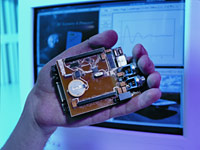Computer Engineering - 3645
Program Summary
Faculty: Faculty of Engineering
Contact: http://www.cse.unsw.edu.au
Campus: Sydney
Career: Undergraduate
Typical Duration: 4 Years
Typical UOC Per Semester: 24
Min UOC Per Semester: 3
Max UOC Per Semester: 27
Min UOC For Award: 192
UAC Code: 425700
International Entry Requirements: See International Entry Requirements
Award(s):
Bachelor of Engineering (Major)
View program information for previous years
Program Description
Within the program, students study foundational courses in Maths and Physics, as well as core computing and electronics courses. In later years, students have a range of elective choices, in areas such as networks, operating systems, embedded systems, telecommunications, and artificial intelligence.
Note
Computer Engineering is also available as a component of the concurrent degree programs:
- BE (Comp Eng)/BCom, program 3715
- BE (Comp Eng)/BA, program 3704
- BE (Comp Eng)/BSc, program 3726
- BE (Comp Eng)/LLB,
- program 4778
- BE (Comp Eng)/MBiomedE, program 3728
- Bachelor of Music/BE (Computer Science)
- program 3459
- Advanced Science/BE (Computer Science)
- program 3941
- Advanced Mathematics/BE (Computer Science)
- program3942
Program Objectives and Graduate Attributes
Program Structure
- COMP1917 Computing 1 (6 UOC)
- COMP1927 Computing 2 (6 UOC)
- ENGG1000 Engineering Design (6 UOC)
- MATH1131 Mathematics 1A (6 UOC)
- MATH1141 Higher Mathematics 1A (6 UOC)
- MATH1231 Mathematics 1B (6 UOC)
- MATH1241 Higher Mathematics 1B (6 UOC)
- PHYS1121 Physics 1A (6 UOC)
- PHYS1131 Higher Physics 1A (6 UOC)
Suggested Year 1 electives for this program are (choose 2):
- ELEC1111 Elec & Telecomm Eng (6 UOC)
- PHYS1221 Physics 1B (6 UOC)
- PHYS1231 Higher Physics 1B (6 UOC)
- COMP2121 Microprocessors & Interfacing (6 UOC)
- COMP2911 Eng. Design in Computing (6 UOC)
- COMP3222 Digital Circuits and Systems (6 UOC)
- ELEC1111 Elec & Telecomm Eng (6 UOC)
- ELEC2134 Circuits and Signals (6 UOC)
- MATH2069 Mathematics 2A (6 UOC)
- MATH2099 Mathematics 2B (6 UOC)
- PHYS1221 Physics 1B (6 UOC)
- PHYS1231 Higher Physics 1B (6 UOC)
- General Education (6UOC)
- COMP3211 Computer Architecture (6 UOC)
- COMP3231 Operating Systems (6 UOC)
- COMP3601 Design Project A (6 UOC)
- ELEC2133 Analogue Electronics (6 UOC)
- ELEC2134 Circuits and Signals (6 UOC)
- Breadth Electives (18UOC)
- Depth Elective (6UOC)
- General Education (6UOC)
- COMP3711 Software Project Management (6 UOC)
- COMP4601 Design Project B (6 UOC)
- COMP4920 Management and Ethics (6 UOC)
- COMP4930 Thesis Part A (6 UOC)
- COMP4931 Thesis Part B (6 UOC)
- Breadth/Coverage Elective (6UOC)
- Depth Electives (18UOC)
Depth courses: Courses that require a Breadth elective, or a core COMP3 course as a pre-requisite. A listing can be found below. A listing can be found here.
Coverage Courses: Other COMP3 or COMP4 courses not listed as Breadth or Depth.
BE First Year Electives can be found at Electives
It is recommended that students start thinking about Industrial Training in the summer after Year 2 and Year 3. Graduation may be delayed if a satisfactory report for 60 days industrial training has not been received by the release of final year results.
The Program Director must approve the program selected by each student if it does not fall within the guidelnes set out for completion of the degree. Not all electives are offered in each session. Students are advised each year of the timetable of available electives. It may be possible to substitute other electives run by the participating schools, apart from those listed below, but this is not permitted if it unduly restricts the range of courses studied overall.
General Education Requirements
Honours
Academic Rules
Fees
Industrial Training
Further Information and Requirements
Professional Recognition
The professional body for engineering in Australia is Engineers Australia, which has as its first objective the promotion of the science and practice of engineering in all its branches.
Engineers Australia has its national headquarters in Canberra and functions through a series of divisions, the local one being the Sydney Division. Within each division are branches representing the main interests within the profession, e.g. civil, mechanical, electrical, engineering management and environmental engineering.
Students of an approved school of engineering may join the Institution as a student member (StudIEAust). Student members receive the monthly publication Engineers Australia and for a small fee they also receive The Transactions which contains articles on a particular branch of engineering.
Student members are invited to participate in the Excellence Award for Work Experience, the National Young Engineer of the Year Award and to avail themselves of other Engineers Australia services including the Mentor Scheme and industrial experience guidance.
For more information and membership application forms, contact Engineers Australia, Sydney Division, Level 3, 8 Thomas Street, CHATSWOOD NSW 2067 - telephone 02 9410 5600 www.engineersaustralia.org.au
The Australian Computing Society
The peak professional body for computing in Australia is the Australian Computing Society (ACS) - www.acs.org.au
The objectives of the ACS can be found here and include: "advanc[ing] professional excellence in information and communications technology, and further[ing] the study, science and application of information and communications technology."
Again, students who want to join ACS should go to Join Now
Area(s) of Specialisation









